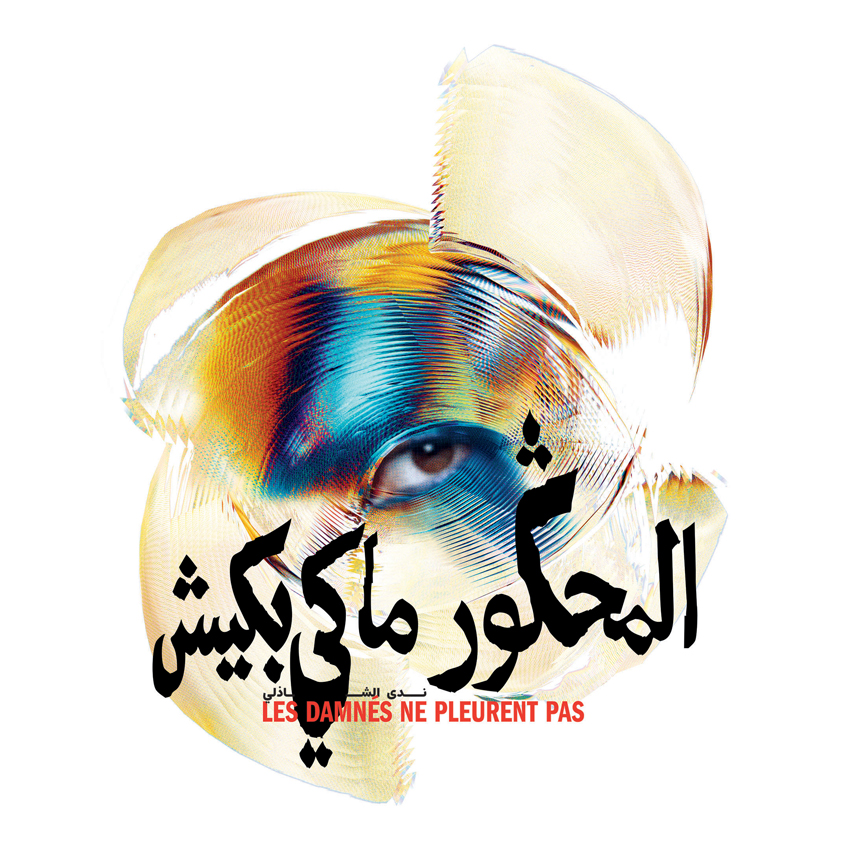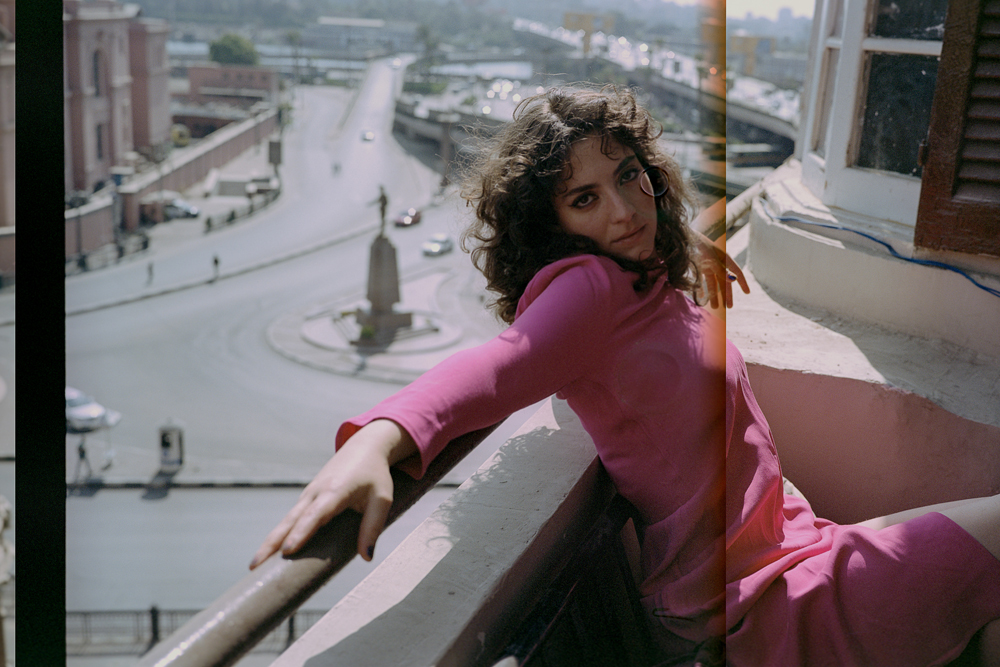 Geeta Dayal
Geeta Dayal
The Egyptian composer and vocalist reshaping Cairo’s
experimental music scene.

Les damnés ne pleurent pas, by Nadah El Shazly, Asadun Alay Records
• • •
One could argue that modern electronic music was invented in Egypt in 1944, several years before Europe and North America caught on. It was then that the composer Halim El-Dabh created what is believed to be the earliest known recording of electronic music, “Wire Recorder Piece.” El-Dabh pushed the small device (more lo-fi than a tape recorder, and often used for military applications) to its limits, layering and editing samples of a zaar ceremony to create unearthly sounds.
The Egyptian musician, vocalist, and composer Nadah El Shazly is at the vanguard of a new era for Cairo’s experimental electronic music scene, which has been going strong for many years; several musicians in the city, like Maryam Saleh, Nancy Mounir, Maurice Louca, and the band Dwarfs of East Agouza have achieved international renown. El Shazly’s songs mix traditional acoustic instruments, such as oud and harp, with synthesizers and digitally treated vocals. Her range of inspirations is wide, from classical Arabic music to jazz and punk rock (she was briefly the lead singer in a Misfits cover band).
El Shazly’s singing is otherworldly and agile, sliding between notes and climbing octaves with ease. Since her breakthrough 2017 debut Ahwar—a wildly ambitious record that included over twenty guest musicians, including horn players, guitarists, percussionists, string musicians, and a choir—she has been very prolific; this year she is releasing several albums, including a score for the independent film Les damnés ne pleurent pas and a duo album titled Pollution Opera.
At a recent concert in Los Angeles, joined by Sarah Pagé on harp and electronics, El Shazly hovered above a small red Korg monophonic synthesizer, fluidly bending pitches and shaping melodies while transfixing the audience with acrobatic vocals. She closed the show with a song from Ahwar; the music was an emotional laser beam aimed directly at the heartstrings. As sung by El Shazly, the Arabic lyrics expressed deep feelings that were palpable even if you didn’t understand the language.

Nadah El Shazly. Photo: Malak El Sawi.
Her newly released score for the intensely moving 2022 film Les damnés ne pleurent pas, by the British-Moroccan director Fyzal Boulifa, is spare and haunting. In the movie, a single mother and her teenage son struggle to survive in Morocco. As they move from town to town, their journey is fraught with desperation and harsh revelations, and their relationship is often strained. When they reach Tangier, their fortunes seem to shift.
The score makes canny use of improvisation to mirror the uncertainty in the characters’ lives. The songs—with dark titles like “Claustrophobic Love,” “Fight with Auntie,” and “Counting Money”—are stark and melancholy. But each instrument (including Pagé on harp and electronics, Jonah Fortune on double bass, and Nicolas Royer-Artuso on violin) seems to grow more harmonious and tuneful as the movie progresses. This, it turns out, is by design. “We experimented with many different musical avenues but eventually discovered that improvisation was the key to establish the precariousness and improvised quality of the characters’ existence,” El Shazly writes in the album notes. “Gradually, this improvisational backdrop would gracefully evolve into something more refined and melodious, evoking a direct emotional response as the film unfolded.”
It might seem a little bit too pat, too on-the-nose, to reflect the gradual improvement of the characters’ lives by starting out noisy and discordant and slowly becoming more mellifluous. In the hands of a less skilled composer, this thematic conceit could easily devolve into cliché. But it works here, partly because the music is not paired so literally with the film; at times, the score seems to contrast emotionally with the visuals, rubbing up against the story in ways that are less easy to predict. Even if you haven’t seen the film, the subtle, nuanced tracks are a spellbinding listen. “Mausoleum” has a hallucinatory, eerie melody, like an antique music box. “More Lies” is a slow and pensive cello dirge ruptured by noisy slashes of violin. “End Credit,” the final track, is downcast and moody, but tender and uplifting at the same time. All of the instruments come together, delicately wrapping melodic lines around each other.
El Shazly is remapping Egyptian music, but perhaps more importantly, she is helping to reshape experimental music at large to be more inclusive of other cultures and experiences. While reading the concept for her forthcoming album, Pollution Opera, I was struck by how much of our knowledge of field recordings and sampling within experimental music has been shaped by the West and Western landscapes—from John Cage’s fascination with the sounds of Manhattan traffic to R. Murray Schafer’s Canadian conception of the soundscape and the natural world. In the recent book Media for the Masses: Cassette Culture in Egypt, the scholar Andrew Simon writes about the country’s sonic terrain, and how its fascinating “acoustic past” has not received enough attention. So it is refreshing to hear El Shazly’s collaboration with the Welsh experimental musician and producer Elvin Brandhi, a dystopian noise record inspired by motorbike rides through the chaotic, dusty streets of Cairo, a city that has been ranked the second loudest in the world, along with also being one of the most polluted. An amalgam of samples from the tumultuous urban sprawl is combined with shrieking vocals and distorted synths.
El Shazly’s music is like a rush of new energy, a link between the past and present of Egyptian music that is fresh and vital. In a 2018 essay for the Wire, she wrote about how some turn-of-the-century music, to her ears, still felt utterly futuristic. She was mesmerized by famous Egyptian singers from a hundred years ago, particularly Abdel Latif Al-Banna and Mounira Al-Mahdeya: “It feels as though they are effortlessly and freely moving back and forth through time—transcending oversimplified and rigid musical rules and allowing for some sort of time travel, reaching out to each other for a common pulse that is only theirs.” In Cairo, where electronic music was invented, El Shazly’s music goes back to the future.
Geeta Dayal is an arts critic and journalist specializing in twentieth-century music, culture, and technology. She has written extensively for frieze and many other publications, including the Guardian, Wired, the Wire, Bookforum, Slate, the Boston Globe, and Rolling Stone. She is the author of Another Green World (Bloomsbury, 2009), a book on Brian Eno, and is currently at work on a new book on music.